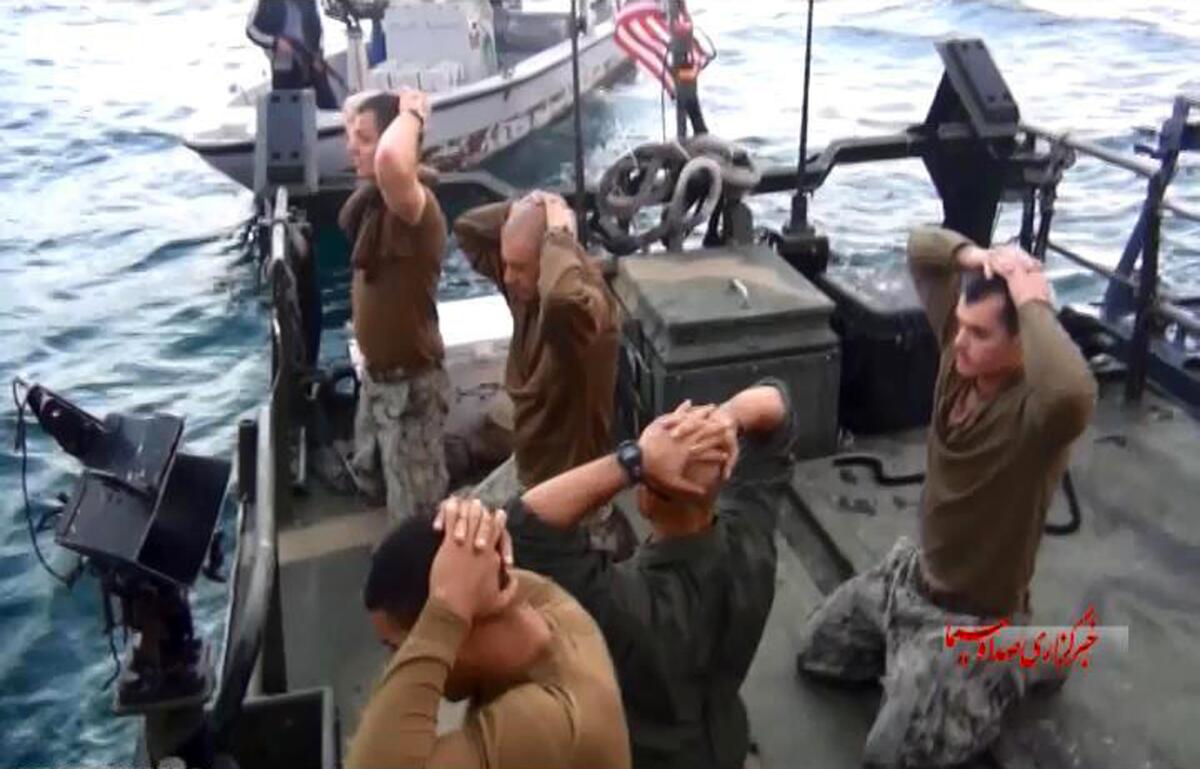Op-Ed: Did Iran ‘toy’ with the U.S.?

U.S. Navy sailors detained by Iran after their two small boats allegedly drifted into Iranian territorial waters.
Imagine that two Iranian naval vessels drifted into waters controlled by and near a United States naval base. Would the Americans salute the Iranians, thank them for stopping by, then send them on their way? Perhaps offer them a cup of hot chocolate? Apparently American hawks think that kid-glove treatment is the norm in such situations, and that anything less is a bona fide outrage, perhaps even a reason to rip up international agreements.
Just before President Obama was set to deliver his final State of the Union address Tuesday, news came down that 10 American Navy crew members aboard two small boats somehow (we don’t yet know the technical details) ended up in Iranian waters. The Iranians seized the boats and detained the sailors. Then, Wednesday morning, the Iranians released their “hostages.”
What’s remarkable is not that the Iranians detained a few American sailors, but that they ended their detention so quickly.
Although that can’t have been a pleasant experience for anyone involved, the truth is that the Iranians were well within their rights to act as they did, visited no harm on the Americans and quickly resolved the issue.
Yet Washington’s Iran hawks — who have fought Obama’s groundbreaking diplomacy with the Islamic Republic tooth and nail — didn’t let the non-crisis go to waste. Within hours they were gleefully scoring points, using the incident to justify their opposition to the Iran deal and thumb their noses at Obama’s naive trust in the Iranian government.
Republican presidential contender Sen. Marco Rubio (R-Fla.) said the action was “provocative.”
“No one should be surprised by Iran’s behavior today,” Sen. Tom Cotton (R-Ark.) said, correctly, since seizing other countries’ military ships in one’s territorial waters is entirely unsurprising. “President Obama should communicate to the ayatollahs that unless they immediately release our sailors and boats, the United States will nullify the Iran nuclear deal and take all necessary measures to recover the service members they’ve apprehended.”
Sen. Cory Gardner (R-Colo.) offered the silliest advice, suggesting that Obama delay the State of the Union address to “talk about exactly what happened.” And the right-wing pro-Israel commentator Robert Satloff went for pure snark, tweeting: “Sounds like our new friends aren’t so friendly.”
Naturally, no one could outdo GOP presidential front-runner Donald Trump, who tweeted this gem after the Iranians released the sailors: “Iran toys with U.S. days before we pay them, ridiculously, billions of dollars. Don’t release money. We want our hostages back NOW!”
In their eagerness to malign a state that they’ve always regarded as an enemy, and a nuclear deal they’ve opposed from the get-go, Washington’s hawks missed the real story. What’s remarkable is not that the Iranians detained a few American sailors, but that they ended their detention so quickly.
In 2007, 15 British sailors and marines were seized by Iranian authorities while conducting an inspection of a merchant ship in what the Iranians claimed were their territorial waters. It took Iran, then under the leadership of the hard-line President Mahmoud Ahmadinejad, 13 days to release the Britons. By contrast, Tuesday’s incident — under the leadership of moderate President Hassan Rouhani — lasted less than 24 hours.
If the Obama administration hadn’t signed the nuclear deal with Iran, if it had maintained the George W. Bush administration status quo, Tuesday’s mishap might well have been a repeat of 2007.
The Bush administration barred high-level contacts with the Iranians, leading American military officials to express concern that precisely the type of incident that occurred Tuesday could spiral out of control.
“We’ve not had a direct link of communication with Iran since 1979,” Adm. Michael G. Mullen said in 2011. “And I think that has planted many seeds for miscalculation. When you miscalculate, you can escalate and misunderstand.” He added, “Any channel would be terrific.”
Now we have a channel, and not just any channel. After news of the incident broke, Secretary of State John F. Kerry immediately called Iranian Foreign Minister Mohammad Javad Zarif, whom he knows quite well. The men have established a rapport over two years of tough negotiations leading up to the nuclear deal.
It’s worth noting that the sailors were detained by Iran’s Revolutionary Guard, a redoubt of hard-line opposition to diplomacy with the West and which has shown a willingness to defy Rouhani in order to embarrass him. On this occasion, the guard corps chose a different course.
Neoconservatives often bristle at the notion that our hard-liners and their Iranian counterparts seem to be working toward the same goal: namely, confrontation between our two nations. Returning to the imaginary scenario of Iranian boats drifting into an American naval base, one can’t help but wonder, would our hard-liners have acted as sensibly as the Revolutionary Guard?
Ali Gharib is a contributor to the Nation based in Brooklyn who writes about American foreign policy.
Follow the Opinion section on Twitter @latimesopinion and Facebook
More to Read
A cure for the common opinion
Get thought-provoking perspectives with our weekly newsletter.
You may occasionally receive promotional content from the Los Angeles Times.










